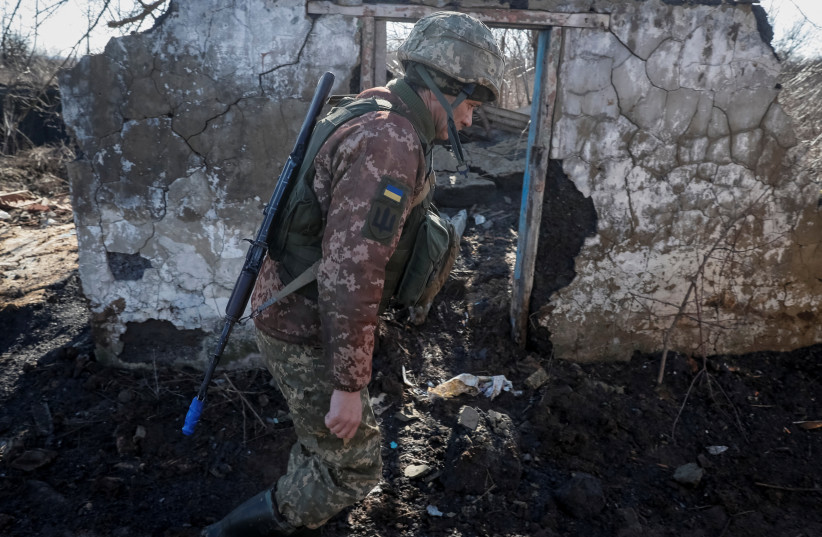Foreign Minister Yair Lapid decided to move the Israeli Embassy in Kyiv to Lviv on Monday in case Russia invades Ukraine.
Lviv is farther west and therefore a greater distance from the border on which Russia has amassed an estimated 160,000 to 190,000 troops.
Israel began providing consular services in Lviv last Thursday, and the rest of the Kyiv embassy’s operations will move there in the coming days.
“The Foreign Ministry is prepared for all developments, including the possibility of a land evacuation,” the ministry said. “In that framework, Israeli diplomats... serving in Poland, Slovakia, Romania, Moldova and Hungary visited border crossings with Ukraine and held meetings with the border authorities to ensure passage for Israeli citizens who may seek to leave Ukraine.”
Despite the efforts and the government’s entreaties over the past week, only about 4,000 out of an estimated 12,000 Israelis had left Ukraine as of Monday.

Regarding increasing talk by Israeli officials about following the US if it imposes sanctions on Russia, Lapid said Israel has its own considerations to weigh.
Israel “will do the right thing according to our set of values,” he said.
While Israel has “liberal democratic values,” there are other considerations as well, he added.
Lapid said Israel was “in a bit of a Baltic situation.”
“We have a kind of border with Russia... the important force inside Syria,” he said in an interview with Jerusalem Post editor-in-chief Yaakov Katz at the Israeli mission of the Conference of Presidents of Major American Jewish Organizations.
In addition, Russia and Ukraine have large Jewish communities, Lapid said, and therefore he has to be “more careful than any other foreign minister in the world.”
“I think there is an understanding of this,” he said. “This is where the special relationship [with the US] comes into play. They understand this because they understand us. We have a mutual vocabulary, a language that we share.”
Lapid said a Russian invasion of Ukraine was still avoidable and expressed hope that French President Emmanuel Macron’s mediation efforts will be fruitful.
“There is still enough room for a diplomatic effort to try to make this invasion, which looks inevitable, not happen,” he said.
During a Yesh Atid faction meeting later on Monday, Lapid said his fellow cabinet ministers should not comment on the situation in Ukraine.
Lapid’s remarks came the day after an interview in which he was widely reported as having said Israel was considering sanctions. The quotes were repeated in many Israeli outlets as well as on Russian state media, though Lapid’s spokesman said he had been misunderstood.
Channel 12 anchor Oded Ben-Ami asked Lapid, “If the Americans indeed impose sanctions, will we participate and impose sanctions on Russia, taking into consideration all of the considerations you talked about and the importance of our relationship with Russia?”
“Look, we will have to consider it,” Lapid said. “That is not the situation. You must understand, we are not there... At this stage, our intelligence assessment is different from that of the Americans and the Brits and is closer to that of some of our European allies. We are acting cautiously and need to act cautiously. What you’re talking about, when we get there, we’ll take care of it.”
When asked by Channel 12 on Monday about Lapid’s comments, Diaspora Affairs Minister Nachman Shai said: “It is clear that in this story, our heart is with one side, with the Americans. We are trying, and I think we are doing it well, to maneuver between all the forces involved without taking a clear public stance, with the hope that the crisis will end without fire, without casualties and without a military confrontation.”
While Israel and the US share history, interests and values, Russia “is our next door neighbor... in the Mediterranean basin and over Syria,” he said.
Knesset Foreign Affairs and Defense Committee chairman Ram Ben Barak said he hopes Israel will not reach a situation in which it will have to join sanctions on Russia.
“In the end, if we ever have to choose a side, we will pick the American side,” Ben Barak told 103FM.
Transportation Minister Merav Michaeli told 103FM: “There is no question that the special relationship between Israel and the US, which this government is working on rehabilitating and rebuilding, is not the same as Israeli relations with Russia.”
Earlier this month, Prime Minister Naftali Bennett instructed ministers not to express opinions about the tensions on the Russia-Ukraine border and to focus only on helping Israelis leave Ukraine.
He reiterated the government’s warning to Israeli citizens in Ukraine at Sunday’s cabinet meeting.
“This is not the time to say, ‘It’ll be OK,’” Bennett said. “It’s better to be inconvenienced now than to be in real danger later. Come home.”
